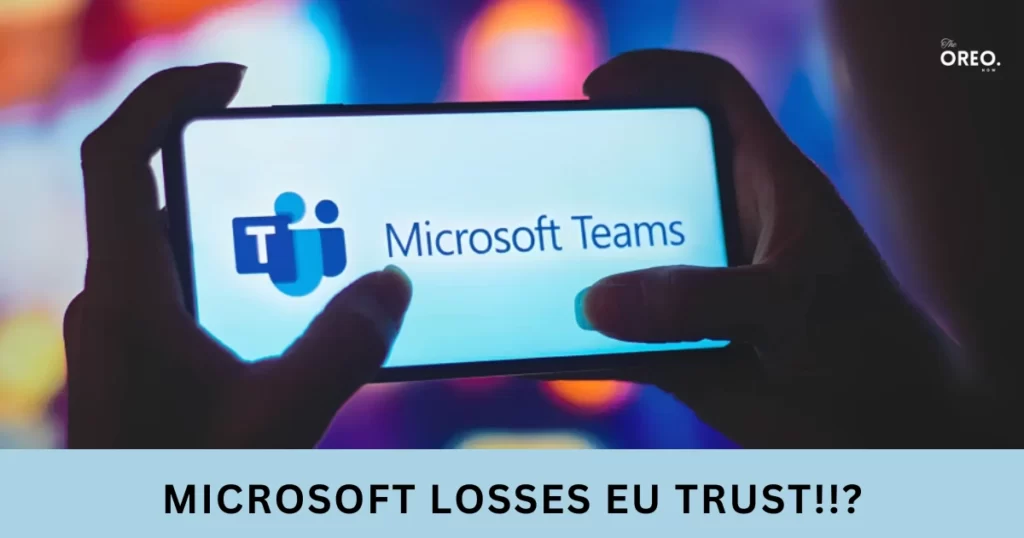Microsoft Faces European Antitrust Investigation
Microsoft Faces a European Union antitrust Investigation for bundling its Teams communications app with its popular Office suite, due to concerns that the company might be excluding competitors.
Key points:
- On Thursday, the European Union started looking into whether Microsoft’s bundling of its video and chat app Teams with other Office products is fair.
- The EU’s executive arm, the European Commission, is worried that these practices might not be good for competition.
- This concern about Microsoft’s competitiveness was brought up in 2020 when a rival app called Slack complained to the EU.
The European Union (EU) has opened a formal antitrust investigation into Microsoft’s bundling of its Teams communications app with its popular Office suite. The investigation was launched following a complaint from Slack, a rival communications platform.
Slack alleges that Microsoft is using its market dominance in productivity software to promote teams and exclude competitors unfairly.
The EU is concerned that the practices used by Microsoft could give an unfair advantage to it in the market for visual communications software. If the investigation finds that Microsoft has violated EU antitrust rules, the company could be fined up to 10% of its global annual turnover.
Microsoft has denied any wrongdoing and has said that it is committed to complying with all applicable laws. The company has also said that it is open to working with the EU to address any concerns that it may have.
But, What antitrust laws did Microsoft violate? Read further to find out!
What’s the reason for the European Union’s investigation into Microsoft?
The European Union’s (EU) investigation into Microsoft is focused on the company’s bundling of its Teams communications app with its popular Office suite. The EU is concerned that Microsoft may be using its market dominance in productivity software to unfairly promote Teams and exclude competitors.
Specifically, the EU is investigating the following allegations:
- Microsoft forces Teams onto customers who purchase Office 365, making it difficult or impossible to remove Teams from their systems.
- Microsoft hides the true cost of Teams from customers, making it seem like a more affordable option than rival products.
- Microsoft uses Teams to collect data from customers, which it then uses to improve its own products and services.
The European Union is checking on Microsoft because they believe Microsoft might have done something against the rules of fair competition among companies.
This investigation began after Slack, a messaging platform from Salesforce Inc., raised concerns three years ago. The EU wants to find out if Microsoft has been giving its products an unfair advantage over other companies products.
In order to eliminate competition. In other words, the EU investigates Microsoft over concerns about eliminating competition.
EU opens antitrust Microsoft Over Teams bundling

The European Commission (EC) opens into Microsoft over teams bundling with its Office suite. The probe was launched on July 27, 2023, following a complaint from Slack, a rival communications platform.
The chief, Margrethe Vestager, said that remote communication and collaboration tools like Teams have become very important for many businesses in Europe.
She mentioned that it’s essential to make sure that these markets stay competitive so that companies can freely choose the products that suit their requirements best.
A spokesperson from Microsoft said that the company will work together with the commission during the investigation. They respect the European Commission’s efforts in this matter and take their responsibilities seriously.
The company is determined to find solutions that will address the concerns raised by the commission.
What is the ‘Bundling Teams video conferencing app’?
Bundling the Teams video conferencing app with the Office suite is a controversial practice that has been the subject of antitrust investigations by the European Union and the United States.
Microsoft argues that bundling Teams with Office is a way to give customers a better experience, as they can use all of their productivity tools in one place. However, critics argue that bundling Teams gives Microsoft an unfair advantage over its competitors, as it makes it more difficult for businesses to switch to other video conferencing platforms.
The US Department of Justice (DOJ) is also investigating Microsoft’s bundling of Teams. The DOJ is concerned that Microsoft’s practices could violate antitrust laws, which prohibit companies from engaging in anti-competitive conduct.
The outcome of the antitrust investigations into Microsoft’s bundling of Teams is still uncertain. However, the investigations are a sign that regulators are concerned about the power of tech giants and the need to protect competition.
Here are some of the arguments for and against bundling Teams with Office:
Arguments for bundling Teams with Office:
- It gives customers a better experience, as they can use all of their productivity tools in one place.
- It makes it easier for businesses to adopt Teams, as they don’t have to purchase it separately.
- It helps to promote innovation, as Microsoft can use data from Teams to improve its other products.
Arguments against bundling Teams with Office:
- It gives Microsoft an unfair advantage over its competitors.
- It stifles innovation in the video conferencing market.
- It limits consumers’ choice of video conferencing platforms.
The debate over bundling Teams with Office is likely to continue for some time. Only time will tell whether regulators will take action to prevent Microsoft from continuing this practice.
Antitrust probe Microsoft over teams in the US and Europe
Microsoft is facing antitrust probes in both the United States and Europe over its bundling of Teams with Office.
In the United States, the Department of Justice (DOJ) is investigating whether Microsoft’s bundling of Teams with Office violates antitrust laws. The DOJ is concerned that Microsoft’s practices could stifle innovation in the video conferencing market and harm consumers by limiting their choice of platforms.
In Europe, the European Commission (EC) is also investigating Microsoft’s bundling of Teams with Office. The EC is concerned that Microsoft’s practices could give the company an unfair advantage over its competitors and could harm consumers by limiting their choice of video conferencing platforms.
What will be the outcome?
If the DOJ or the EC finds that Microsoft has violated antitrust laws, the company could be fined up to 10% of its global annual turnover. Microsoft could also be forced to change its business practices or even break up its Office suite.
The outcome of the probes could have a major impact on the competitive landscape in the video conferencing market and could set a precedent for how regulators deal with other tech giants in the future.
In addition to the antitrust probes, Microsoft is also facing a lawsuit from Slack, a rival communications platform. Slack alleges that Microsoft’s bundling of Teams with Office is anti-competitive and has harmed Slack’s business. The lawsuit is still pending in court.
The antitrust probes and the lawsuit against Microsoft are a sign that regulators and businesses are increasingly concerned about the power of tech giants. The outcome of these cases could have a major impact on the future of competition in the tech industry.
Must Read: Apple and Samsung Working on Truly Bezels-Less OLED for Future iPhones
OpenAI Announces Launch of ChatGPT Android App Next week: Here’s how to register



One Comment